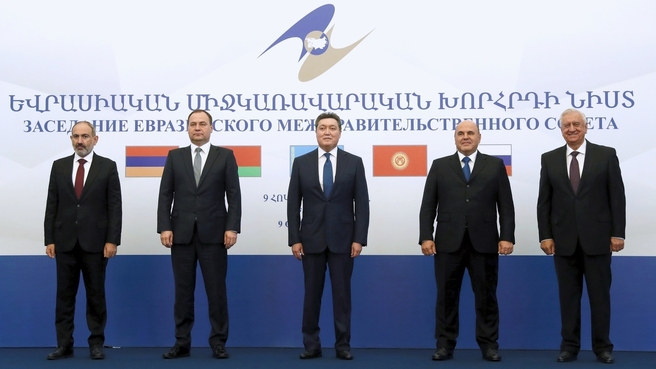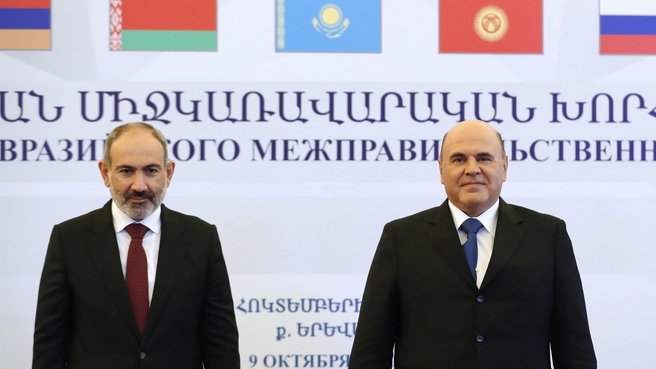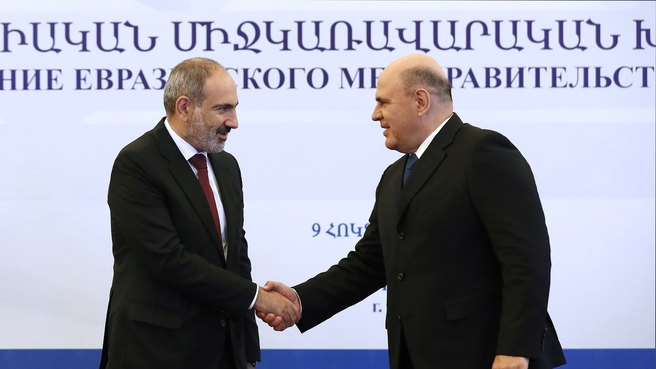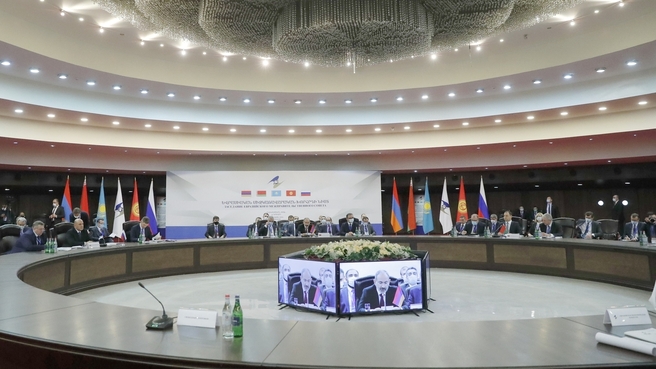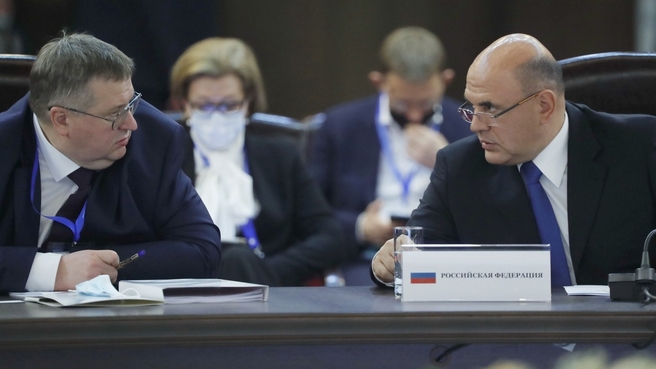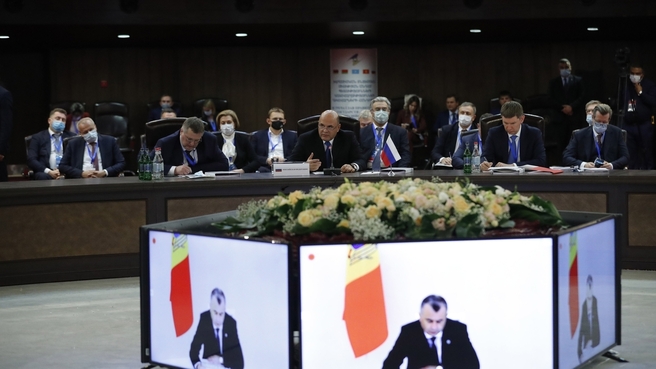The parties discussed topical issues related to the Eurasian Economic Union’s operation, including the draft Strategic Directions for Developing the Eurasian Economic Integration until 2025, cross-border e-commerce regulation and implementation of EAEU regulatory acts.
Mikhail Mishustin’s remarks at the meeting
Delegation heads at the Eurasian Intergovernmental Council meeting:
Group photo of the delegation heads participating in the Eurasian Intergovernmental Council meeting
Prime Minister of the Republic of Armenia Nikol Pashinyan;
Prime Minister of the Republic of Belarus Roman Golovchenko;
Prime Minister of the Republic of Kazakhstan Askar Mamin;
Ambassador Extraordinary and Plenipotentiary of the Kyrgyz Republic to the Russian Federation, the Republic of Armenia and the Hellenic Republic Alikbek Dzhekshenkulov;
Prime Minister of the Russian Federation Mikhail Mishustin;
Chairman of the Eurasian Economic Commission Board Mikhail Myasnikovich;
Prime Minister of the Republic of Moldova Ion Chicu (via videoconference).
Mikhail Mishustin’s remarks at the meeting:
Colleagues,
Let me begin by thanking Nikol Pashinyan and all those who organised today’s meeting of the Intergovernmental Council that is taking place in these challenging times. I would also like to thank Roman Golovchenko and Mikhail Myasnikovich for taking care of all the necessary arrangements.
I would like to express my most sincere words of condolence to the relatives and close ones of those who died or were wounded during these days in the Nagorno-Karabakh conflict zone. We mourn together with all those who lost their close ones in this conflict. Of course, it is critical that all hostilities are immediately halted and to move forward with a diplomatic settlement. Russia is ready to facilitate this process, together with other countries co-chairing the OSCE Minsk Group.
Now to the actual agenda of this meeting.
We continue our efforts to develop Eurasian integration, focusing on the overall strengthening of the market and promoting sustainable development in all the five countries.
These are challenging times. We are living with a number of overlapping factors, including the global economic crisis caused by the coronavirus, external interference in Belarus, the escalation in Nagorno-Karabakh and the dramatic developments in Kyrgyzstan. In this context, we need to consolidate our unity and work together in order to come up with answers to these complex challenges.
Even now, despite all the stress we face, we are upholding the traditions of mutual assistance. The Russian Federation shipped coronavirus testing kits to the EAEU countries. Our doctors travelled to Armenia, Kyrgyzstan, Kazakhstan and Moldova to give our foreign colleagues a hand. They shared their advice and took care of the patients.
This kind of experience in mutual cooperation can be especially useful when the incidence rate is growing. If necessary, our five countries will be ready to take urgent measures. We all share the same goal of preserving the lives and health of our citizens.
As you are aware, in August Russia registered the world’s first coronavirus vaccine. We are already building up capacity to carry out a mass voluntary vaccination campaign for our nationals at the end of the year. We believe that our EAEU partners should be among the first to receive the Russian vaccine once the mass vaccination campaign gets underway in Russia.
Colleagues,
We have discussed the draft Strategic Directions for Developing the Eurasian Economic Integration until 2025. On the whole, the document has been coordinated. It is planned to adopt it at a meeting of the Supreme Eurasian Economic Council. It is important that this strategy provides the necessary basis for priority economic development of the EAEU countries and for strengthening its positions on the international stage.
I would like to say a few words about the priority spheres of our further activities which we consider to be of utmost significance.
The first of them concerns the marking of goods. We must streamline our national marking systems and remove obstacles hindering the monitoring of the turnover, primarily within our five states. We must also introduce as soon as possible the mechanisms of monitoring the goods that are imported into the EAEU. It is a crucial condition for ensuring the transparency of our common market.
Second, the digital transformation of all economic sectors. Over the past few years we have created a solid foundation for implementing it throughout the EAEU. We have launched the first digital projects in industry, transport and other spheres, where the further development of cooperation will enhance the competitiveness of our economies.
Third, we must create a single system for regulating government procurement. Some steps have already been made towards this. We are creating a special register. The companies whose industrial products have been included in it will be able to take part in government procurement.
I am sure that a new approach to government procurement will help us to promote industrial cooperation between our countries.
Fourth, food security. We can report good results in this sphere. The EAEU is self-sufficient in the production of grain, sugar, vegetable oil, pork, eggs and lamb. Our goal for next year is to become self-sufficient in other agricultural sectors, which is absolutely realistic.
Fifth, support for our exports. The EAEU must become a full-fledged member of global trade, considering that our five states are increasing trade with third countries. To further develop our exports, we must improve the support mechanisms of producers both in each of our states and also at the EAEU level.
And lastly, we must continue to expand the international contour of our union, look for new opportunities for interaction with other countries and developing mutually beneficial cooperation with them.
Colleagues,
I am sure that our dynamic and coordinated efforts in all spheres I have mentioned will allow us to deal with the consequences of the novel coronavirus infection, restore economic growth and make full use of the potential of our Eurasian integration association. The most important thing is that we have a desire to coordinate our efforts and to work together.
I would like once again to invite all heads of government to Moscow on 4 December for the next meeting of the Intergovernmental Council and the first Eurasian Congress organised by the Eurasian Development Bank. We plan to discuss very many issues at its plenary session, including our economies’ advantages, economic integration prospects and digital transformation.
Documents signed following the meeting of the Eurasian Intergovernmental Council:
- Instruction on the sanitary and epidemiological situation and resuming passenger service within the Eurasian Economic Union
- Instruction on the progress in drafting the Strategic Directions for Developing Eurasian Economic Integration until 2025
- Instruction on the principle directions in regulating cross-border (external) online trade in goods within the Eurasian Economic Union
- Instruction on the progress in the implementation of the Eurasian Economic Union acts
- Instruction on the progress in carrying out measures (the roadmap) to eliminate exemptions and restrictions within the internal market of the Eurasian Economic Union in 2018 and 2019
- Directive on joint export facilitation measures
- Decision on the draft decision by the Supreme Eurasian Economic Council on the performance of the Eurasian Economic Union budget in 2019
- Directive on the draft decision by the Supreme Eurasian Economic Council on the Eurasian Economic Union budget in 2021
- Directive on the state of mutual trade among Eurasian Economic Union member states in 2019
- Directive on crediting and distributing import customs duties between the budgets of Eurasian Economic Union member states in 2019
- Directive on joint forecasts regarding agro-industrial complex development, balance between supply of and demand for agricultural products, food, flax fibre, rawhide, cotton fibre and wool in Eurasian Economic Union member states in 2020-2021
- Directive presenting to the Supreme Eurasian Economic Council a candidate to the Eurasian Economic Commission Board
- Directive regarding the time and place of the next meeting of the Eurasian Intergovernmental Council.
